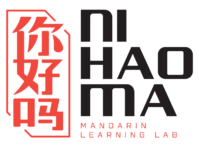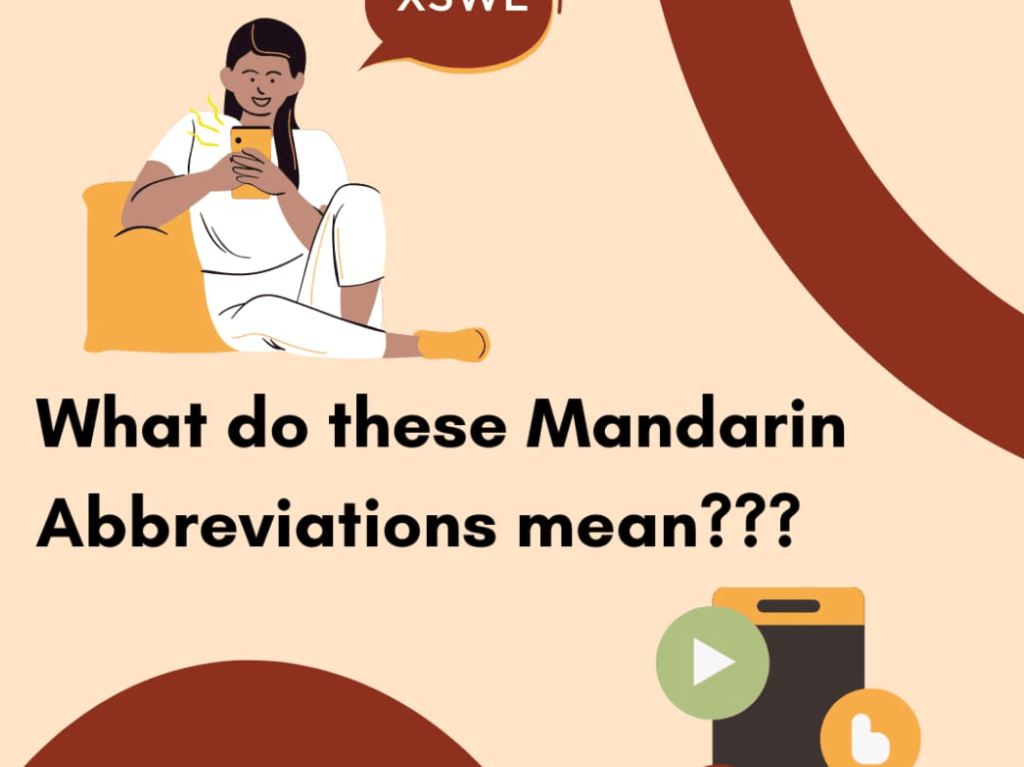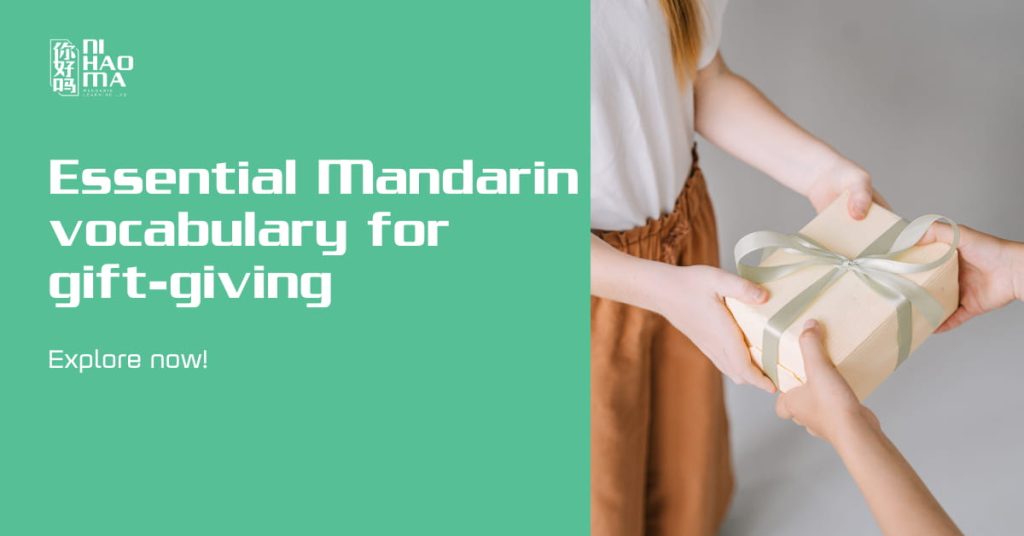The Mid-Autumn Festival, also known as the Reunion Festival, is one of the most important and beautiful traditional celebrations in East Asian culture. Understanding and correctly using Chinese vocabulary about the Mid-Autumn Festival not only helps improve your fluency in communication but also allows you to appreciate the cultural richness of this holiday. In this article, Ni Hao Ma will guide you through essential Chinese vocabulary related to the Mid-Autumn Festival, focusing on common activities and traditional foods associated with the celebration.
What is the Mid-Autumn Festival in Chinese?
In Chinese, the Mid-Autumn Festival is called 中秋节 (Zhōngqiū Jié). It is one of the most significant and well-loved traditional holidays in Chinese culture, celebrated annually on the 15th day of the 8th month in the lunar calendar.
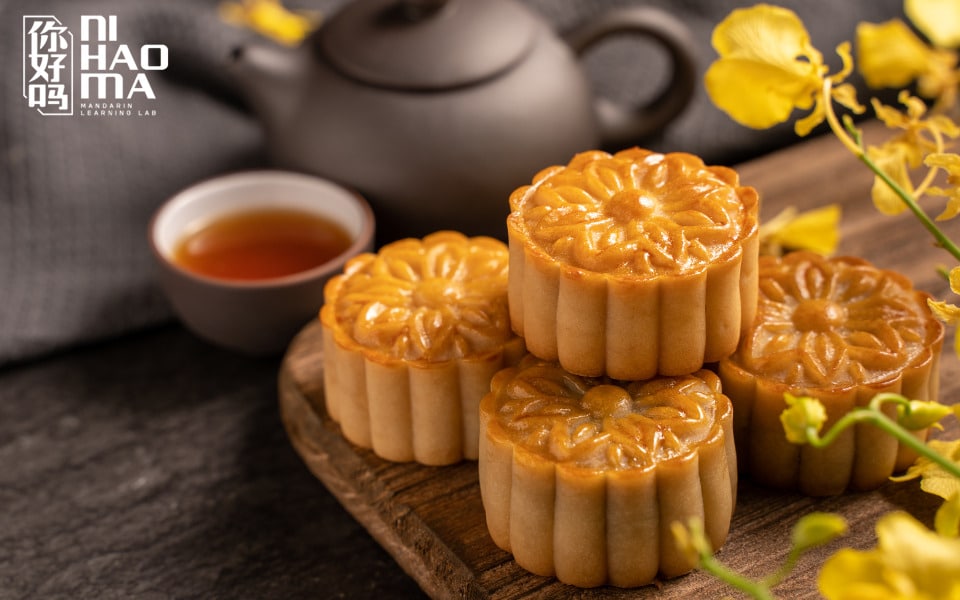
The Mid-Autumn Festival is also known as the Moon Festival, Reunion Festival, or Lantern Festival. It marks the time of year when the moon is at its fullest and brightest, symbolizing wholeness, abundance, and reunion. Historically, the festival is believed to be rooted in ancient agricultural societies’ moon worship rituals. Over time, its meaning evolved to emphasize family togetherness and harmony. In Vietnam, the Mid-Autumn Festival is especially known as the Children’s Festival, where kids enjoy lion dances, lantern parades, and festive food parties.
Chinese vocabulary about the Mid-Autumn Festival
The Mid-Autumn Festival is not only a time for enjoying mooncakes and moon-gazing — it’s a unique cultural tradition celebrated in several Asian countries. If you’re passionate about learning Chinese and curious about this festive occasion, here’s a curated list of must-know Chinese vocabulary about the Mid-Autumn Festival:
| Chinese (中文) | Pinyin | Meaning |
|---|---|---|
| 中秋节 | Zhōngqiū jié | Mid-Autumn Festival |
| 月亮 | yuèliàng | Moon |
| 月饼 | yuèbǐng | Mooncake |
| 嫦娥 | Cháng’é | Chang’e (Moon Goddess) |
| 后羿 | Hòuyì | Houyi (Archer in legend) |
| 神仙 | shénxiān | Immortal |
| 仙女 | xiānnǚ | Fairy / Celestial maiden |
| 传说 | chuánshuō | Legend |
| 月光 | yuèguāng | Moonlight |
| 满月 | mǎnyuè | Full moon |
| 花灯 | huādēng | Decorative lantern |
| 赏月 | shǎngyuè | Moon-gazing |
| 团圆 | tuányuán | Reunion |
| 农历 | nónglì | Lunar calendar |
| 阳历 | yánglì | Solar calendar |
| 烧香 | shāoxiāng | Burn incense |
| 玉兔 | yùtù | Jade Rabbit (Moon Rabbit) |
| 玩具 | wánjù | Toy |
| 舞狮 | wǔshī | Lion dance |
| 礼物 | lǐwù | Gift |
| 天灯 | tiāndēng | Sky lantern |
| 烟花 | yānhuā | Fireworks |
| 节日 | jiérì | Festival / Holiday |
| 热闹 | rènào | Lively / Bustling |
| 民俗 | mínsú | Folk custom |
| 家宴 | jiāyàn | Family banquet |
| 风俗 | fēngsú | Tradition / Custom |
| 赏灯 | shǎngdēng | Lantern viewing |
| 美满 | měimǎn | Happiness / Fulfillment |
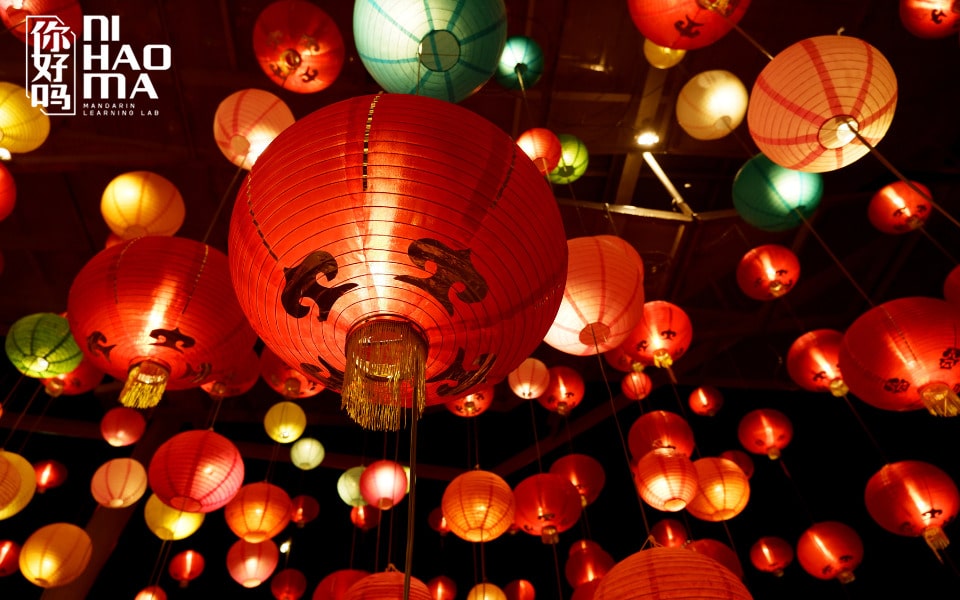
| Chinese | Pinyin | Meaning |
|---|---|---|
| 家人 | jiārén | Family members |
| 烤肉 | kǎoròu | Grilled meat |
| 礼物 | lǐwù | Gift |
| 饮料 | yǐnliào | Beverage |
| 水果 | shuǐguǒ | Fruits |
| 秋天 | qiūtiān | Autumn |
| 玩花灯 | wán huādēng | Lantern parade |
| 天空 | tiānkōng | Sky |
| 神话 | shénhuà | Mythology |
| 祈福 | qífú | Pray for blessings |
| 聚会 | jùhuì | Gathering |
| 榕树 | róngshù | Banyan tree |
| 邀请 | yāoqǐng | Invite |
| 中秋夜 | zhōngqiū yè | Mid-Autumn night |
| 糖果 | tángguǒ | Candy |
| 亲情 | qīnqíng | Family love |
| 拜祭祖先 | bài jì zǔxiān | Ancestor worship |
| 烘焙 | hōngbèi | Baking |
| 馅料 | xiànliào | Filling (for mooncakes) |
| 愿望 | yuànwàng | Wish |
| 传统节日 | chuántǒng jiérì | Traditional festival |
| 纪念 | jìniàn | Commemoration |
| 味道 | wèidào | Taste |
| 童年 | tóngnián | Childhood |
| 节气 | jiéqì | Solar term |
| 诗词 | shīcí | Poetry |
| 红包 | hóngbāo | Red envelope |
| 乐器 | yuèqì | Musical instrument |
Sample Conversations about the Mid-Autumn Festival
The Mid-Autumn Festival is one of the most important traditional celebrations for the Chinese people and several other Asian cultures. When learning Chinese, practicing topic-based conversations is a great way to remember vocabulary and sentence structures more effectively. With its traditional customs, signature foods, and fascinating legends, the Mid-Autumn Festival is a perfect theme for improving your communication skills — especially through learning Chinese vocabulary about the Mid-Autumn Festival.
Conversation 1
A:中秋节快到了,你打算怎么过?
Zhōngqiū jié kuài dàole, nǐ dǎsuàn zěnme guò?
The Mid-Autumn Festival is coming — how are you planning to celebrate?
B:我打算回老家和家人一起过节。每年中秋我们一家人都会吃团圆饭,真的很温馨。
Wǒ dǎsuàn huí lǎojiā hé jiārén yīqǐ guòjié. Měi nián Zhōngqiū wǒmen yī jiārén dōu huì chī tuányuán fàn, zhēn de hěn wēnxīn.
I’m going back to my hometown to celebrate with my family. Every Mid-Autumn Festival we have a reunion dinner—it’s really warm and cozy.
A:听起来好幸福!你们还做什么?
Tīng qǐlái hǎo xìngfú! Nǐmen hái zuò shénme?
That sounds so happy! What else do you do?
B:我们会一起做月饼,还有小孩会提灯笼。晚上就坐在院子里赏月聊天。
Wǒmen huì yīqǐ zuò yuèbǐng, hái yǒu xiǎohái huì tí dēnglóng. Wǎnshàng jiù zuò zài yuànzi lǐ shǎngyuè liáotiān.
We make mooncakes together, and the kids carry lanterns. At night we sit in the courtyard, admire the moon, and chat.
A:你会做月饼?太厉害了!
Nǐ huì zuò yuèbǐng? Tài lìhài le!
You can make mooncakes? That’s awesome!
B:哈哈,其实我只会帮忙搅馅儿,妈妈才是真正的大厨。
Hāhā, qíshí wǒ zhǐ huì bāngmáng jiǎo xiànr, māma cái shì zhēnzhèng de dàchú.
Haha, I only help stir the filling—my mom is the real chef.
A:我从来没吃过自制的月饼,有机会一定要尝一尝。
Wǒ cónglái méi chī guò zìzhì de yuèbǐng, yǒu jīhuì yīdìng yào cháng yī cháng.
I’ve never tried homemade mooncakes—if I get the chance, I definitely want to taste some!
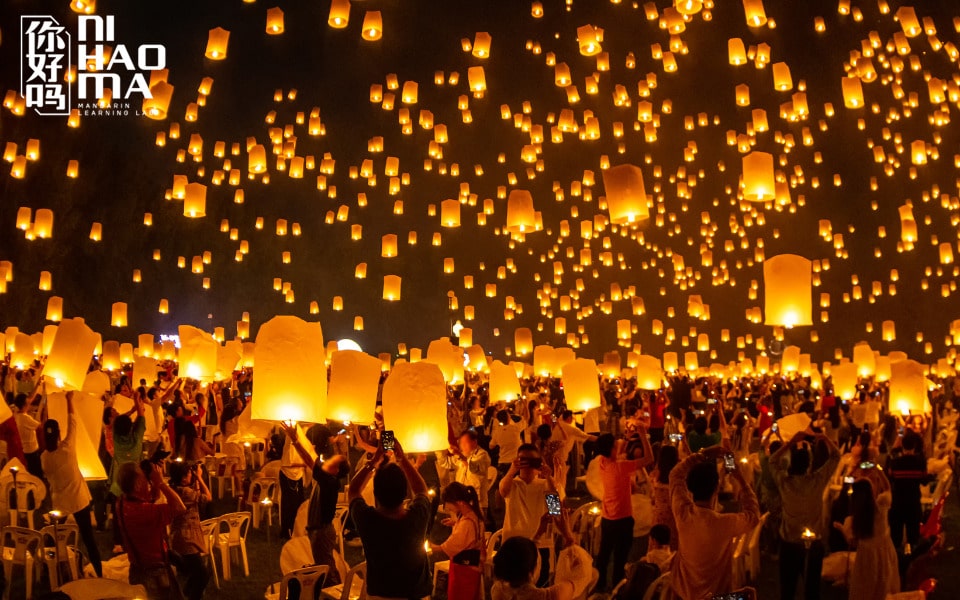
Conversation 2
A:中秋节是中国的传统节日之一吧?我最近在学习这个节日的文化。
Zhōngqiū jié shì Zhōngguó de chuántǒng jiérì zhī yī ba? Wǒ zuìjìn zài xuéxí zhège jiérì de wénhuà.
The Mid-Autumn Festival is one of China’s traditional holidays, right? I’ve been studying the culture behind it.
B:没错,中秋节在农历八月十五,是赏月和团圆的日子。
Méi cuò, Zhōngqiū jié zài nónglì bāyuè shíwǔ, shì shǎngyuè hé tuányuán de rìzi.
That’s right. The Mid-Autumn Festival falls on the 15th day of the 8th lunar month—a day for moon-gazing and family reunion.
A:为什么要赏月呢?和月亮有什么特别的关系吗?
Wèishéme yào shǎngyuè ne? Hé yuèliàng yǒu shéme tèbié de guānxì ma?
Why do people watch the moon? What’s so special about it?
B:有一个有趣的传说,叫“嫦娥奔月”。她为了保护仙药,最后飞上了月亮,住在月宫。
Yǒu yí gè yǒuqù de chuánshuō, jiào “Cháng’é bēn yuè”. Tā wèile bǎohù xiānyào, zuìhòu fēi shàng le yuèliàng, zhù zài yuègōng.
There’s a famous legend called “Chang’e Flies to the Moon.” To protect an elixir of immortality, she flew to the moon and now lives in the Moon Palace.
A:哇,太浪漫了!还有其他活动吗?
Wā, tài làngmàn le! Hái yǒu qítā huódòng ma?
Wow, that’s so romantic! What other activities are there?
B:当然!比如吃月饼、提灯笼、猜灯谜,还有放烟花。
Dāngrán! Bǐrú chī yuèbǐng, tí dēnglóng, cāi dēngmí, hái yǒu fàng yānhuā.
Plenty! Eating mooncakes, carrying lanterns, solving lantern riddles, and sometimes setting off fireworks.
A:听起来很好玩!
Tīng qǐlái hěn hǎowán!
Sounds like a lot of fun!
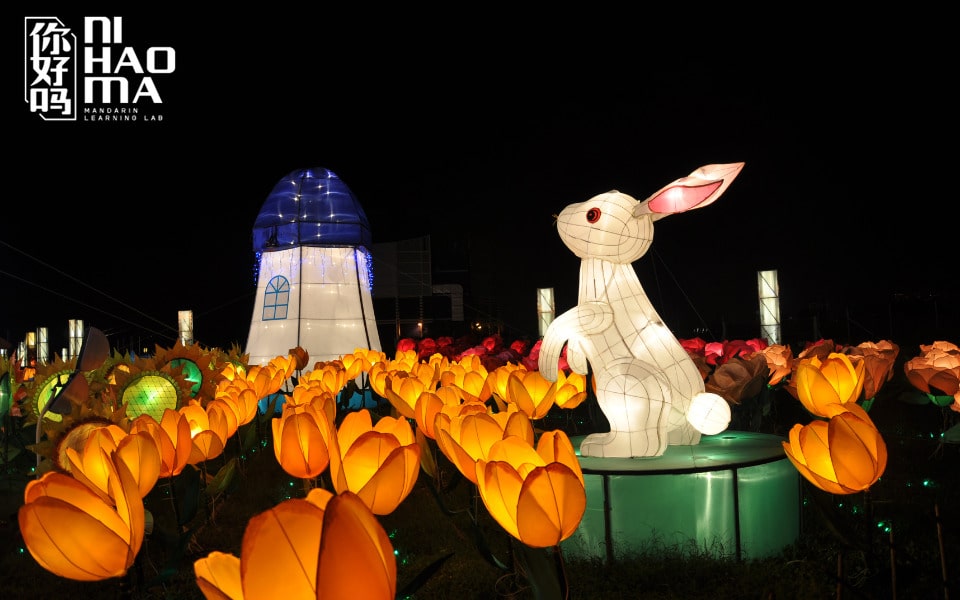
Conversation 3
A:你觉得中秋节最特别的地方是什么?
Nǐ juéde Zhōngqiū jié zuì tèbié de dìfang shì shénme?
What do you think is the most special thing about the Mid-Autumn Festival?
B:我觉得是团圆的意义。中国人很重视家庭,这个节日能让大家聚在一起。
Wǒ juéde shì tuányuán de yìyì. Zhōngguó rén hěn zhòngshì jiātíng, zhège jiérì néng ràng dàjiā jù zài yìqǐ.
For me it’s the idea of reunion. Family matters a lot in Chinese culture, and this holiday brings everyone together.
A:对,而且还有很多传统习俗,比如赏月、吃月饼、挂灯笼。
Duì, érqiě hái yǒu hěn duō chuántǒng xísú, bǐrú shǎngyuè, chī yuèbǐng, guà dēnglóng.
Right—and there are so many traditions, like moon-gazing, eating mooncakes, and hanging lanterns.
B:我最喜欢的是猜灯谜,虽然有时候不太懂,但很有趣。
Wǒ zuì xǐhuān de shì cāi dēngmí, suīrán yǒu shíhòu bù tài dǒng, dàn hěn yǒuqù.
I like solving lantern riddles the most. I don’t always understand them—but they’re fun!
A:你明年打算回国还是留在中国过节?
Nǐ míngnián dǎsuàn huíguó háishì liú zài Zhōngguó guòjié?
Do you plan to go home next year or stay in China for the holiday?
B:我想留在中国,再多体验几次真正的中秋节。
Wǒ xiǎng liú zài Zhōngguó, zài duō tǐyàn jǐ cì zhēnzhèng de Zhōngqiū jié.
I want to stay in China and experience a few more authentic Mid-Autumn Festivals.
Conclusion
We hope that with Ni Hao Ma‘s curated list of Chinese vocabulary about the Mid-Autumn Festival and the sample dialogues above, you now have a solid foundation to confidently engage in conversations on this festive topic. Learning vocabulary by theme not only helps you memorize faster but also allows for a deeper connection with native culture. Try applying these words in your daily conversations, writing a Mid-Autumn Festival greeting in Chinese, or retelling a legend you enjoy. Wishing you success and a truly memorable Mid-Autumn celebration!
